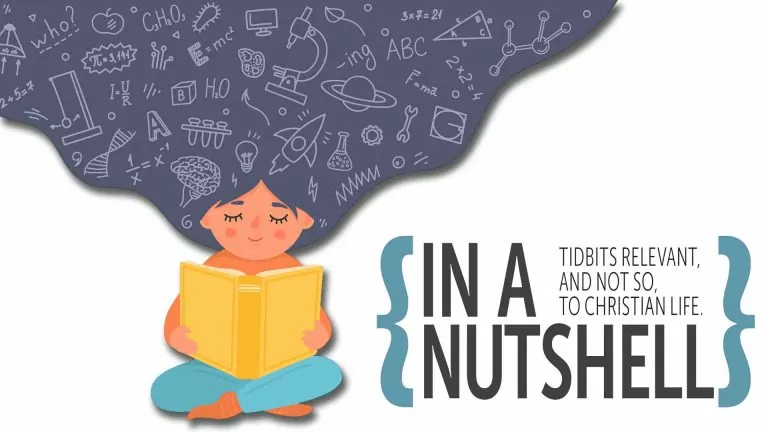Is it in the Bible?
Many common phrases either have their origins in the Bible, or are direct quotes from the Bible. But some phrases are only thought to come from the Bible. Out of the ten phrases below can you tell which are straight from the Bible, and which aren’t? Answers can be found at the bottom of this page.
- God works in mysterious ways
- Fly in the ointment
- The lamb will lie down with the lion
- How the mighty have fallen
- God helps those who help themselves
- Can a leopard change his spots?
- Pouring oil on troubled waters
- A house divided against itself cannot stand
- To the victor goes the spoils
- Pride goes before a fall
Christians did better during the pandemic
In a June 15 article in Scientific American, psychologist David H. Rosmarin outlined that in the midst of the loneliness caused by Covid lockdowns, there was a group whose mental health actually improved:
In the past year, American mental health sank to the lowest point in history: Incidence of mental disorders increased by 50 percent, compared with before the pandemic, alcohol and other substance abuse surged, and young adults were more than twice as likely to seriously consider suicide than they were in 2018. Yet the only group to see improvements in mental health during the past year were those who attended religious services at least weekly (virtually or in-person): 46 percent report “excellent” mental health today versus 42 percent one year ago. As former congressional representative Patrick J. Kennedy and journalist Stephen Fried wrote in their book A Common Struggle, the two most underappreciated treatments for mental disorders are “love and faith.”
The psychologist takes these findings in a secular direction, proposing that his collegues consider encouraging essentially a faux form of spirituality in patients, for their mental health’s sake. What he’s managed to miss, Christians can see clearly: that this demonstrates how our God knows us, and knows what we need. In giving us a day of rest where we can gather – even if only in a virtual sense – God, every week again, reminds us of Who remains in charge, and gives us the opportunity and encouragement of being a hand and foot to one another. There’s real comfort in knowing that God remains in control, and also in experiencing the fellowship of being with His people.
On the need to read right
Encouraging our children to read for reading’s sake is a popular notion, but akin to encouraging them to watch TV for TV watching’s sake. If there’s no quality to the content, then our goal shouldn’t just be to have them consume more of it. As Katherine Patterson put it, “It is not enough to simply teach children to read; we have to give them something worth reading.”
- “You don’t have to burn books to destroy a culture. Just get people to stop reading them.” – Ray Bradbury
- “The man who does not read good books is no better than the man who can’t.” – Mark Twain
- “I believe we should spend less time worrying about the quantity of books children read and more time introducing them to quality books that will turn them on to the joy of reading and turn them into lifelong readers.”–James Patterson
- “Outside of a dog, a book is a man’s best friend. Inside of a dog, it’s too dark to read.” – attributed to Groucho Marx
- “Somebody who only reads newspapers and at best books of contemporary authors looks to me like an extremely near-sighted person who scorns eyeglasses. He is completely dependent on the prejudices and fashions of his times, since he never gets to see or hear anything else.” – Albert Einstein
- We read to know we are not alone.” – William Nicholson (putting the words into C.S. Lewis’ mouth, in his play Shadowlands)
How your phone is hindering you
When teacher Julie Holland Griggs’ class was studying Fahrenheit 451, she decided to run an experiment. She had her students:
“…make a tally mark each time they got a notification on their phone. Grand total for today: 1,687 notifications. That’s 1,687 interruptions to learning caused by cell phones. One of the central ideas of [Farenheit] 451 is that constant, mindless distractions prevent people from developing authentic relationships and suppress deep thought. Hmmm…”
Griggs is a highschool teacher in Alabama, but when she posted about the experiment news of it spread to some pretty far corners of the world. A teacher in Iceland, Hrönn Árnadôttir tried it out on his 7th graders, and by day’s end his 20 students had received 1,963 notifications, or an average of 98 per student. Most of them were not personal messages – just notices from Snapchat, etc. – but the lure to check it remains nonetheless. Then, when it was lunch time, the students turned to chat with each other via their phones, rather than face to face.
Going really old school in school
Even as our schools are getting decked out in technology – with laptops and tablets replacing textbooks and binders – can a case be made for the efficacy of chalk and slate? As Carol Wilson has described it, the process of education is about:
- Inputs – the teacher presenting
- Understanding – the student taking in
- Demonstration – the student shows they understand
- Retention – the student uses the information in different ways, so as to remember it
One reason big classes can be hard to manage is this third step, demonstration. Just consider that if a teacher was to call on students in oral discussions, if they had a class of 30, each student might only have to offer an answer every few days. If a student kept their head down, the interval might even be weeks. Then the teacher migth not know until quiz time, or when an assignment comes in, whether the class understood the day’s lesson.
To remedy this – to allow for more instant feedback, from more – Carol Wilson suggests a return to the slate, relaying how a class might look with the tool in hand:
Material to be taught has been presented, and the discussion is in progress. The teacher asks a question, and this time everyone writes an answer on his board. …the students turn their boards at the request of the teacher, and in a matter of seconds he knows who gets the point and who does not. Then the teacher very quickly makes an appropriate comment to each child, usually taking up his most pressing mistake, but not forgetting praise where due, either. Here, again and again, in a short time many crucial knowledge transactions take place. These boards are highly versatile for all kinds of classroom work: dictation of sentences, spelling lists, sentence diagraming, math problems, vocabulary sentences and tests, as well as all kinds of comprehension questioning and interpretation…
Her suggestion was first made 42 years ago, in the October 1979 edition of the Biblical Educator, but even as we’d update her individual chalkboard to whiteboards instead, might the merits of this old-school approach remain?
You might be a Dutch Calvinist if …
- you can sing “Ere zij God” even though you can’t speak Dutch
- you’re suspicious of the environmental movement but reuse plastic margarine containers
- your post-church Sunday lunch has cake as the entree and soup for dessert
- you can quote Lord’s Day 1 of the Heidelberg Catechism
- you’ve ever had an advocaat headache
- You consider hagelslag on bread a major food group
- You’ll sugar coat your food, but not your words
- you’ve got more lace on your windows than on your laundry line
- your closet is divided into Sunday clothes, and everything else
Source: As adapted from items seen on the Internet
Answers to “Is it in the Bible?”
- No – though the idea seems to be expressed in 1 Corinthians 1:26-29.
- No – but while it isn’t a direct quote it probably has its origins in Ecclesiastes 10:1, which reads: “Dead flies make the perfumer’s ointment give off a stench.”
- No – the closest the Bible comes to this phrase is in Isaiah 11:6 and 65:25, where a lamb and a wolf are paired together.
- Yes – David uses this phrase in 2 Sam. 1:19,25 as he laments the death of Jonathan.
- No – and in one important sense the Bible teaches the very opposite.
- Yes – in Jeremiah 13:23: “Can the Ethiopian change his skin or the leopard his spots?”
- No – it is very old though, appearing in writings from the 1st century AD.
- Yes – Jesus uses this phrase as a defense against the accusation that he was casting out demons using the power of Satan.
- No – this was said by New York senator William L. Macy
- No – though it is an abridgment. The phrase comes from Prov. 16:18 where it says: “Pride goes before destruction, and a haughty spirit before a fall.”












